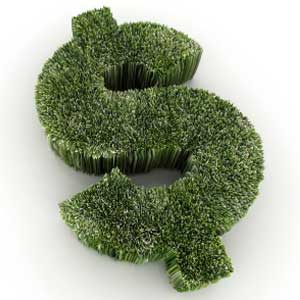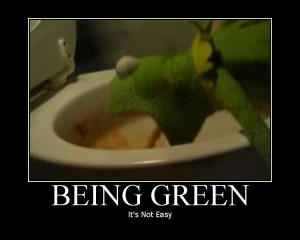Return on Investment

 Long time buddy Richard Titus, co-producer of Who Killed the Electric Car proclaims “Sustainability is not about asceticism, it does not require one to forgo life’s pleasures – instead it is about developing and living a lifestyle, which can endure, conceivably forever. The Opposite of sustainability is not consumerism, it’s Nihilism.” and asserts “Sustainability is about moving the point of consumption to align with one of oversupply.
Fired by my paper pique, I went looking for self-important but ineffectual green “solutions.“ I was sure, for instance, that paper towels or plates don’t create any more planetary problems than using all that water and energy on the dishwasher.
But nailing down the true cost/benefit on these “eco-pieties” proved a challenge, starting with the dishes vs. paper debate. Web research turned up highly ranked, and highly useless, sites like this one, where readers are asked what they thought was likely to be the best approach. No one bothered to actually figure it out, they just asked for opinions. Mush-headed stuff like this drives me crazy.
Long time buddy Richard Titus, co-producer of Who Killed the Electric Car proclaims “Sustainability is not about asceticism, it does not require one to forgo life’s pleasures – instead it is about developing and living a lifestyle, which can endure, conceivably forever. The Opposite of sustainability is not consumerism, it’s Nihilism.” and asserts “Sustainability is about moving the point of consumption to align with one of oversupply.
Fired by my paper pique, I went looking for self-important but ineffectual green “solutions.“ I was sure, for instance, that paper towels or plates don’t create any more planetary problems than using all that water and energy on the dishwasher.
But nailing down the true cost/benefit on these “eco-pieties” proved a challenge, starting with the dishes vs. paper debate. Web research turned up highly ranked, and highly useless, sites like this one, where readers are asked what they thought was likely to be the best approach. No one bothered to actually figure it out, they just asked for opinions. Mush-headed stuff like this drives me crazy.
Paper vs. Plates just one question in the bigger picture
Part 2 in a series on conflicts between environmental and economic impulses in all of us, and how we resolve them.
“How to be green? Many people have asked us this important question. It’s really very simple and requires no expert knowledge or complex skills. Here’s the answer: Consume less. Share more. Enjoy life.” – Derek WallI was at a friend’s home recently when I noticed he had no paper napkins, towels or tissues, because, he said, he wanted to reduce the impact on the planet. Meanwhile, his SubZero dishwasher was running full bore. Tug of War Economics or Ethics? And it got me thinking: In our pious zeal to feel better about the mess we’re collectively making of the planet, many of us have settled on personal steps to green things up a bit. But are those steps really worthwhile, or just sops to make us feel less guilty? What’s the real return on investment of these options compared to some alternative? At CGI Clinton Global Initiative, RampRate and I studied how data center emissions could be chopped 60%. And the cost would tumble too. But that often isn’t enough to overcome the hurdles of corporate decisions. Green doesn’t always pay. The grass isn’t always greener on the other side of the green.
“We won’t have a society if we destroy the environment.” – Margaret MeadThe results have led us into some messy and annoying compromises or left us to look for easy, lazy solutions to complex questions. Take the question of paper versus permanent at my friend’s place.
 Long time buddy Richard Titus, co-producer of Who Killed the Electric Car proclaims “Sustainability is not about asceticism, it does not require one to forgo life’s pleasures – instead it is about developing and living a lifestyle, which can endure, conceivably forever. The Opposite of sustainability is not consumerism, it’s Nihilism.” and asserts “Sustainability is about moving the point of consumption to align with one of oversupply.
Fired by my paper pique, I went looking for self-important but ineffectual green “solutions.“ I was sure, for instance, that paper towels or plates don’t create any more planetary problems than using all that water and energy on the dishwasher.
But nailing down the true cost/benefit on these “eco-pieties” proved a challenge, starting with the dishes vs. paper debate. Web research turned up highly ranked, and highly useless, sites like this one, where readers are asked what they thought was likely to be the best approach. No one bothered to actually figure it out, they just asked for opinions. Mush-headed stuff like this drives me crazy.
Long time buddy Richard Titus, co-producer of Who Killed the Electric Car proclaims “Sustainability is not about asceticism, it does not require one to forgo life’s pleasures – instead it is about developing and living a lifestyle, which can endure, conceivably forever. The Opposite of sustainability is not consumerism, it’s Nihilism.” and asserts “Sustainability is about moving the point of consumption to align with one of oversupply.
Fired by my paper pique, I went looking for self-important but ineffectual green “solutions.“ I was sure, for instance, that paper towels or plates don’t create any more planetary problems than using all that water and energy on the dishwasher.
But nailing down the true cost/benefit on these “eco-pieties” proved a challenge, starting with the dishes vs. paper debate. Web research turned up highly ranked, and highly useless, sites like this one, where readers are asked what they thought was likely to be the best approach. No one bothered to actually figure it out, they just asked for opinions. Mush-headed stuff like this drives me crazy.
“Ecology is rather like sex – every new generation likes to think they were the first to discover it.” – Michael AllabyMore tricks, even for older machines: Use the water-saver settings, if any, and save energy by opening the dishwasher before that last dry cycle. Do you do either?
“It’s a morbid observation, but if everyone on earth just stopped breathing for an hour, the greenhouse effect would no longer be a problem.” – Jerry AdlerI’m guessing you could similarly make a case for either side in the paper vs. dishwashing argument, depending on the variables. Me, I’m still leaning toward paper in the short term, depending on whether water or landfill space is scarce near you, and what you do with the plate. I can turn off the water, but a boycott of paper plates seems a mountain too high to climb. Today.
Return on Investment
To help us figure this out, I asked my colleagues at RampRate to build a little calculator to do the math for this conversation. This and other tools will be posted over the coming weeks. They do this sort of thing all the time for our clients, but in a very different space, figuring out the best prices for services like cloud computing, data centers, telecom, and outsourcing. Trade-offs between strategic and price-conscious, price or performance and power versus availability are current Tugs of War that we live with daily. But it’s the same process at heart: figuring out what matters to you, and then connecting to the solution that works best for your particular sliding scale between emotion, economy and environment. It’s a useful exercise in thinking through this particular eco-piety, and the ways it is affected by the many choices we make. That’s the kind of conscious living we need more of, so we aren’t blindly following anyone’s lead on matters that matter. Return on Investment.“Green, how I want you green. Green wind. Green branches.”– Federico Garcia Lorca


